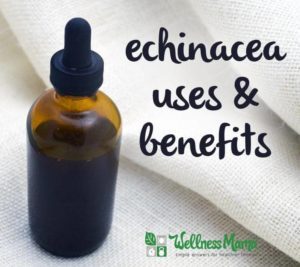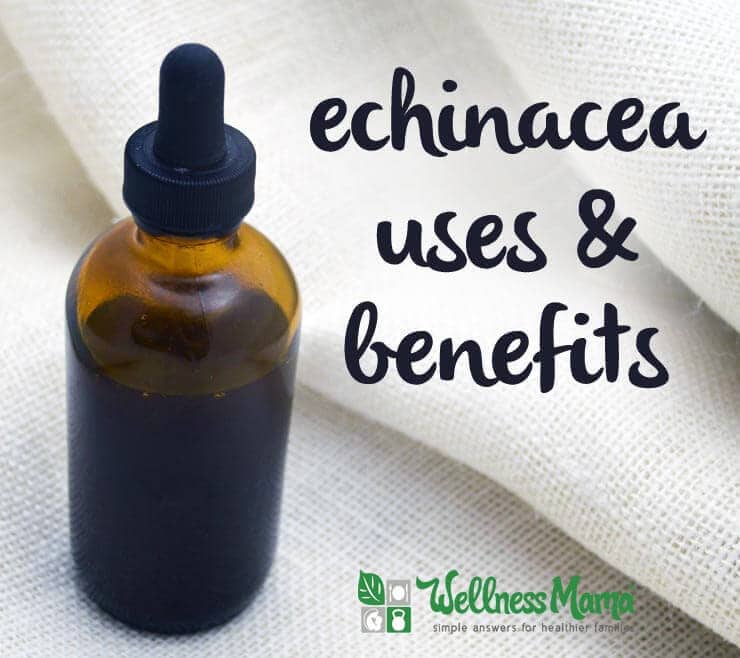I met my husband walking across the country, and it turns out you learn a lot about a person by walking 15+ miles a day with them. At the time, he was a 20-something guy into sports and healthy(ish) eating and I was into academics and pizza (I know, I know… the processed grains and vegetable oils… yikes!).
Discovering Natural Remedies:
After our walk, we had the chance to travel to Europe where my pizza and PB&J habit caught up with me and I got a horrible head cold on the flight over. I landed with an ear infection, cough and sore throat.
Always one to be prepared, my then boyfriend had natural remedies with him on the trip and he force fed me some horrible tasting echinacea tincture. At that time, I was one to turn to antibiotics if I got sick, but that wasn’t an option in a foreign country where I didn’t speak the language and definitely couldn’t navigate the medical system, so I took the nasty tasting tincture that he offered.
To my shock, it worked and I bounced back pretty quickly (yay younger genes and natural remedies!).
Moral of this story?
I definitely have not always been anywhere close to perfect in the nutritional department, so I was intrigued to learn more about natural remedies. In fact, my husband can really take the credit for me starting to research nutrition on a deeper level and learning about natural remedies.
Echinacea was one of the first herbs I researched and while I don’t use it as often now, I’m grateful that it sparked my interest in healthier living.
What is Echinacea?
It is a simple flowering plant and a member of the daisy family. More commonly known as purple coneflower, many people grow this powerful herb without even realizing it! The name derives from the Greek word ekhinos (hedgehog) because the cone resembles a small hedgehog.
What is the Use of Echinacea?
Echinacea purpurea is the species most often used as a natural remedy and in folk medicine. There are 9 distinct species of this plant, though onlyEchinacea purpurea is considered a remedy. A couple of the other species are considered endangered so it is important not to harvest this plant without being certain of which species is being harvested.
The flowers, leaves and roots of this plant can all be used differently in natural remedies. In general, the leaves and flowers are the parts traditionally used in remedies
Where does Echinacea Grow?
Echinacea grows in the central and eastern United States. Native American’s used it as a remedy hundreds of years ago and it is re-gaining popularity in modern times. Those who live in these areas may be able to cultivate this easy-to-grow plant.
Benefits of Echinacea
 Modern research is still divided on the effectiveness of echinacea, and there are some contraindications (like autoimmune disease). I personally rarely use this herb anymore, but many people love this traditional remedy.
Modern research is still divided on the effectiveness of echinacea, and there are some contraindications (like autoimmune disease). I personally rarely use this herb anymore, but many people love this traditional remedy.
Of course, it is important to check with a doctor or medical professional before using this or any herb, especially in cases of disease, medical problems, pregnancy, or in children.
Help for cancer?
Some sources claim that this traditional herb may be helpful for those with cancer, though more research is certainly needed.
Immune Support
The immune supporting benefits are much more studied, though again, this can be a double-edged sword for those with autoimmune disease. A meta-analysis of data from the University of Connecticut showed echinacea may reduce the likelihood of getting a common cold by over half. Even more promising, it also reduced the duration of common colds by over a day on average.
The book Nutritional Herbology points out:
The proven actions of Echinacea are due to water-soluble polysaccharides. They act by sequestering the attacks of various microbes and allow the body to heal itself. Upon reaching an infected area, the polysaccharides have an immunostimulant effect, which results in the production of leucocytes (white blood cells). The resulting phagocytic action of the leucocytes effectively eradicates a number of infectious organisms.
In other words, echinacea can help encourage the immune system which may lead to faster recovery from illness, but this can be harmful for those with autoimmune disease. For those without autoimmune disease, there is some evidence that echinacea can help lessen the symptoms of milk illnesses.
WebMD reports common uses:
Echinacea is widely used to fight infections, especially the common cold and other upper respiratory infections. The people who use echinacea to treat symptoms have the right idea. Research to date shows that echinacea probably modestly reduces cold symptoms, but it’s not clear whether it helps prevent colds from developing.
It is also used against many other infections including the flu, urinary tract infections, vaginal yeast infections, genital herpes, bloodstream infections (septicemia), gum disease, tonsillitis, streptococcus infections, syphilis, typhoid, malaria, and diphtheria.
Uses for Echinacea
- I use it in my herbal throat spray for illness
- A tincture of echinacea may be helpful for shortening cold duration
- Echinacea tea is said to help acute symptoms of illness when used for short times
- I prefer to buy the dried leaf of this herb in bulk and make my own remedies as needed but many pre-made remedies are now available.
How do I Make Echinacea Tincture?
A tincture is essentially an extract. Alcohol tinctures are the most common type and the easiest to make, though vinegar or even glycerin will work (here’s how to modify the recipe for a glycerin tincture).
To make an echinacea tincture with alcohol, you will need:
- A clean pint-size glass jar with lid
- Food grade alcohol like vodka or rum- at least 80 proof (or apple cider vinegar to make a vinegar tincture)
- ½ cup dried echinacea leaf (of a mixture of root and leaf)
Tincture Instructions
- Fill the jar 1/3 to 1/2 full with dried echinacea leaf (or leaf+root). Do not pack down.
- Pour boiling water to just dampen all of the dried herb (a few tablespoons). (This step is optional but helps to draw out the beneficial properties of the herbs).
- Fill the rest of the jar (or the entire jar if not using hot water too) with alcohol and stir with a clean spoon.
- Put the lid on the jar. Store the jar in a cool/dry place, shaking daily, for at least three weeks and up to six months. (I usually leave for six weeks)
- Strain through cheesecloth and compost the herbs. Store the tincture in dark colored dropper bottles or clean glass jars.
Echinacea Cautions
As I mentioned, I rarely use this particular remedy anymore. Those with autoimmune disease should be careful in using echinacea, astragalus, or many other herbs. Chris Kresser explains:
Why? Because autoimmune disease is not only extremely complex, but also highly individualized. Hashimoto’s in one person is not the same as Hashimoto’s in the next person. In one person, Hashimoto’s could present as a Th1-dominant condition. In another, it may present as Th2 dominant. In still another, both the Th1 and Th2 systems might be overactive, or under-active. And each of these cases requires a different approach. For example, botanicals like echinacea and astragalus stimulate the Th1 system. If someone with Th1 dominant Hashimoto’s takes these herbs, they’ll quite possibly get worse. On the other hand, antioxidants like green tea and Gotu Kola stimulate the Th2 system, and would be inappropriate for those with Th2 dominant Hashimoto’s.
I only use echinacea if absolutely needed with my Hashimotos and usually turn to vitamin C and garlic instead. If you suspect an autoimmune condition, make sure to only use immune stimulating herbs under a doctor’s care.
Echinacea should also not be used by pregnant women without a doctor’s recommendation, as there is not adequate research about its safety and since it can cause immune reactions. Nursing moms should also be cautious with echinacea and children should not use echinacea without a doctors care.
Have you ever used echinacea? Did it work for you?


Leave a Reply